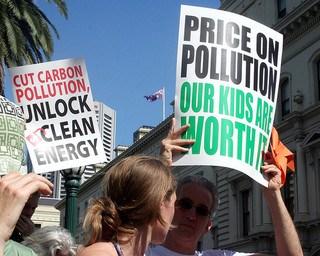
By Brendon Steele
Here’s the beginning of a joke: Citizens Climate Lobby, ExxonMobil, climate scientist James Hansen, and a conservative Heartland Institute spin-off walk into a bar. No, a bar fight doesn’t erupt. Instead, what do they agree on when they walk out?
Not many realize, but they already agree on a carbon tax shift.
Put simply, a tax shift means to cut one tax and replace it with another—such as to cut income and/or payroll taxes, and put a carbon price in their place. This is called a “tax swap” or “revenue neutrality.”
Former NASA scientist James Hansen, the godfather of climate advocacy, has long thought this is a great idea. He argues a carbon tax is the most efficient and effective way to shrink our greenhouse gas emissions, and by refunding the tax instead of just adding it on top, it protects people—and the poor—while keeping government’s “hands off money.”
ExxonMobil—the largest oil refiner in the world—thinks it’s a good business decision, stating on its website: “It is rare that a business lends its support to new taxes. But in this case, given the risk-management challenges we face and the policy alternatives under consideration, it is our judgment that a carbon tax is a preferred course of public policy action versus cap-and-trade approaches.” ExxonMobil advocates revenue neutrality to protect vulnerable populations and spur investments in innovation.
ExxonMobil’s seeming nemesis, Citizens Climate Lobby (CCL), is in complete agreement. A grassroots advocacy nonprofit, CCL trains volunteers to reclaim their democracy and engage elected officials on climate action. It makes clear: “Academic papers studying a carbon tax indicate that a carbon tax with 100 percent revenue recycling can boost the economy, even before considering the economic benefits from improved health and less severe climate impacts. Thus, CCL has chosen to advocate for a policy that will restore the climate and boost the economy.”
Finally, not many people would expect the Heartland Institute—long derided by climate advocates as the quintessential “climate denier”—to put its name anywhere near a carbon tax of any stripe. And it doesn’t. But Heartland’s former Center on Finance, Insurance and Real Estate, which spun-off in 2012 to form its own free-market group, does.
That group, the R Street Institute, has been shaking up the Washington, D.C. policy scene since it formed. R Street passionately believes in small government and the free market, and it went head-to-head with its progenitor on stage in a public debate over a carbon tax. At the end, in a room of 200 conservatives and libertarians, roughly 80 percent stood up to affirm that there is a strong conservative case for a revenue-neutral carbon tax.
Why do so many different types of stakeholders support a carbon tax shift?
Although from very different backgrounds, many within these groups recognize that a carbon tax shift can drive forward something our society needs: prosperity and innovation. That’s because right now taxes are collected on our income, or in other words, our prosperity—what we tax hurts our growth. Shifting taxes from income to pollution stops penalizing our prosperity and starts encouraging sustainable growth.
A simple and clear price on carbon is also the best signal to the economy to do more with less energy—that is, to be productive and to innovate. Innovation (not stimulus) creates value, which leads to lasting economic prosperity. This economic signal to innovate is not driven to nearly the same degree by other policy options or by regulations.
Furthermore, a tax shift’s revenue-neutrality means people—not the government—have the individual freedom to choose how to best spend their income, to benefit themselves and their families. This will produce even more social benefits as people choose options that drive down emissions and drive up productivity, leaving them with more money at the end of the day.
Conservative economist Gregory Mankiw, who advised former President George W. Bush, sums it up: “If the government charged a fee for each emission of carbon, that fee would be built into the prices of products and lifestyles. When making everyday decisions, people would naturally look at the prices they face and, in effect, take into account the global impact of their choices.”
In pursuing our work at Future 500, we’ve seen that the ideas above resonate across the ideological spectrum. As stakeholder engagement experts, it’s our mission to reach out to often polarized groups, and, more importantly, to build alliances across groups that love to hate each other: Rush Limbaugh conservatives, Michael Moore progressives, Ron Paul libertarians and just-get-it-done corporate executives.
We engage stakeholders across these common divides to advance systemic, market-based solutions to some of our greatest challenges. Even amidst pitched partisan battles, innovation-positive solutions—like a carbon tax shift—point to closing the bitter divide between businesses and environmentalists, right and left. We fervently believe that building bridges to find unlikely allies is a needed step to advance a sustainable world.
Image credit: Flickr/Takver
Brendon Steele is a Stakeholder Engagement Manager at Future 500, a global nonprofit specializing in stakeholder engagement and building bridges between parties at odds to advance systemic solutions to urgent sustainability challenges.
TriplePundit has published articles from over 1000 contributors. If you'd like to be a guest author, please get in touch!














